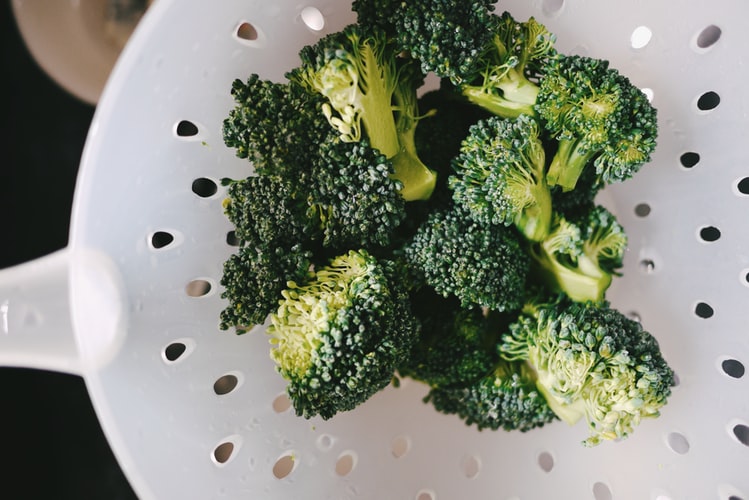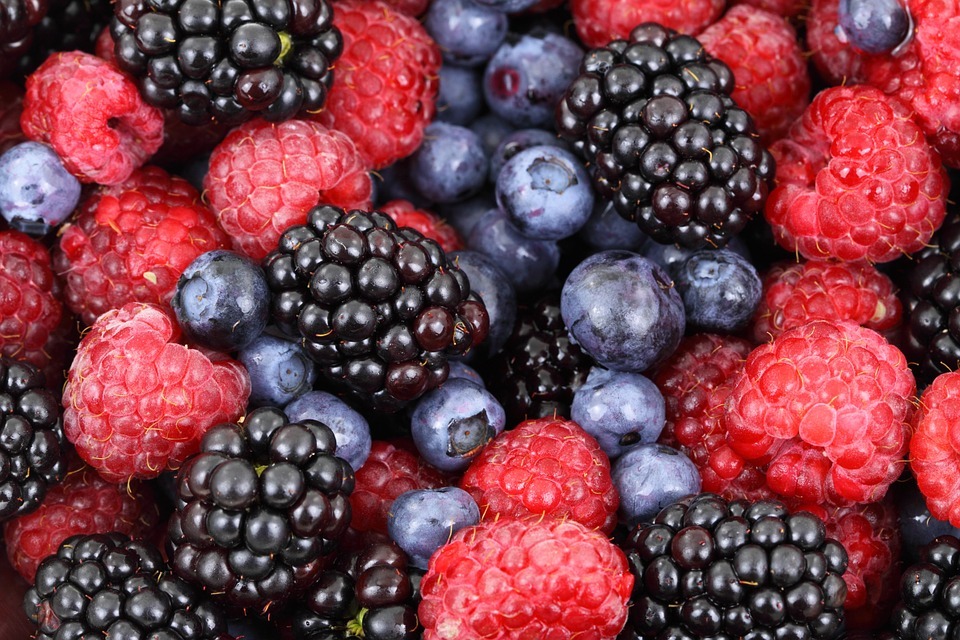Can Fruit Juice Substitute Whole Fruit?
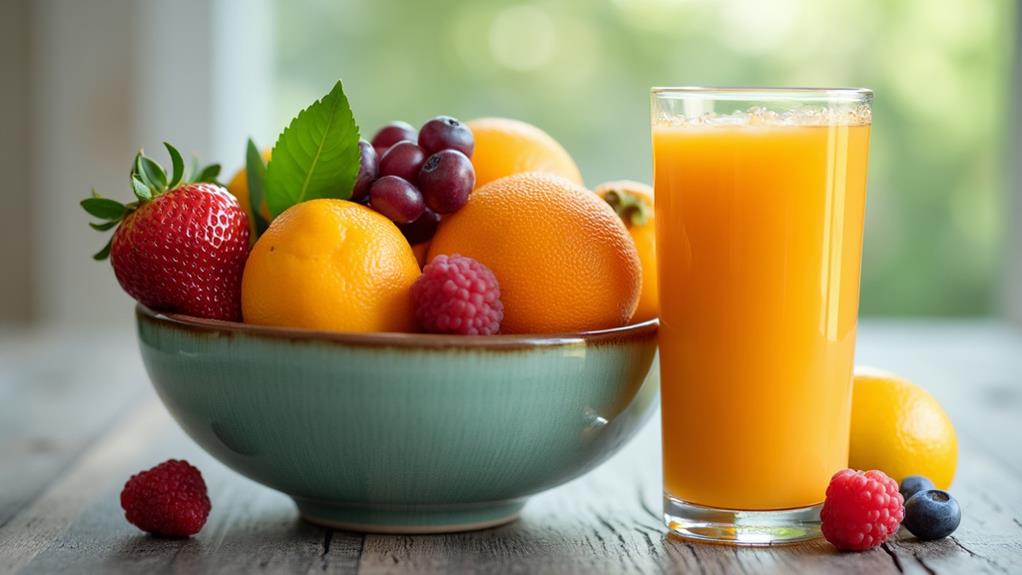
When considering a glass of fruit juice as a replacement for whole fruit, it's important to understand the nutritional implications. While fruit juice may seem like a convenient way to meet your daily fruit intake, it lacks the dietary fiber found in whole fruits. Dietary fiber is crucial for digestion and helps maintain stable blood sugar levels. Additionally, fruit juice often contains high sugar levels, leading to rapid spikes in blood sugar. Therefore, fruit juice is not a suitable substitute for whole fruit. Let's delve into the nutritional differences to understand why.
Nutritional Comparison
While fruit juice might seem convenient, it doesn't measure up nutritionally to whole fruits. When you drink fruit juice, you miss out on the high dietary fiber found in whole fruits. This fiber binds to natural sugars, ensuring slower absorption and more stable blood sugar levels. Without this fiber, fruit juice can cause quick spikes in blood sugar, leading to potential energy crashes and increased hunger.
Whole fruits also retain important nutrients like vitamins and flavonoids, particularly in the pulp and skin. These compounds often get lost during the juicing process, resulting in a less comprehensive nutrient profile for juice. This means you're not getting the full range of benefits that whole fruits offer.
Moreover, fruit juices are typically higher in concentrated sugars, which can increase calorie intake and possibly lead to weight gain. In contrast, whole fruits are more filling and can help reduce total calorie consumption. By choosing whole fruits over juice, you're making a healthier choice that supports better blood sugar control and provides a wider spectrum of vital nutrients.
Fiber and Satiety
Fiber is a crucial component in promoting satiety and regulating appetite. When you consume whole fruits, you benefit from natural sugars, vitamins, and significant dietary fiber. This fiber slows the absorption of sugars, resulting in a more gradual increase in blood sugar levels. Conversely, fruit juice lacks fiber because the pulp and skin, which are rich in fiber, are removed during processing.
Here's why fiber matters:
- Feelings of Fullness: Whole fruits keep you fuller for longer compared to fruit juice, reducing the likelihood of unnecessary snacking.
- Appetite Regulation: Fiber helps control your hunger throughout the day, making appetite regulation easier.
- Weight Management: The high fiber content in whole fruits aids in weight management by contributing to lower overall calorie intake.
- Reduced Risk of Type 2 Diabetes: Studies indicate that replacing fruit juice with whole fruits may lower the risk of type 2 diabetes. Fiber helps manage blood sugar levels and enhances overall dietary quality.
Blood Sugar Impact
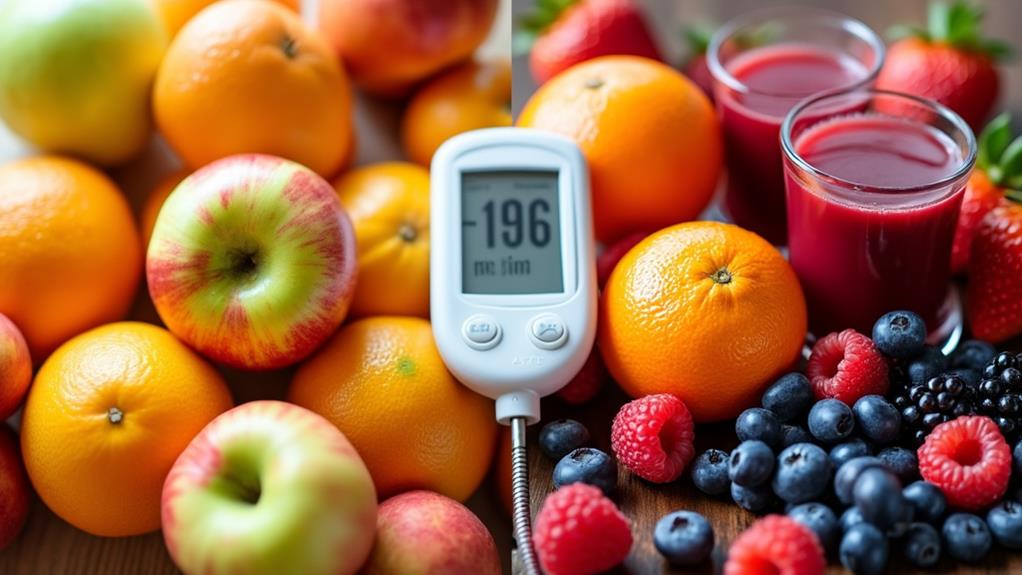
Opting for fruit juice instead of whole fruit is more likely to cause rapid blood sugar spikes due to its high glycemic index. Whole fruits contain fiber, which slows sugar absorption and promotes stable insulin responses. By choosing whole fruits, you can better manage your blood sugar levels and lower the risk of type 2 diabetes.
Blood Sugar Spikes
Consuming whole fruits has a markedly different impact on blood sugar levels compared to drinking fruit juice. The fiber in whole fruits slows the absorption of sugars, leading to a gradual rise in blood sugar levels, which helps maintain stable energy and overall health. In contrast, fruit juices lack this fiber, causing rapid blood sugar spikes and pronounced insulin responses, leading to fluctuating energy levels.
Here's why whole fruits are better for managing blood sugar spikes:
- Lower Glycemic Index: Whole fruits generally have a lower glycemic index than fruit juices, aiding in more effective blood sugar regulation.
- Steady Blood Sugar Levels: The gradual rise in blood sugar from whole fruits helps prevent the quick dips that can follow fruit juice consumption, reducing hunger and cravings.
- Healthier Insulin Response: Whole fruits lead to a more moderate insulin response, avoiding the extreme fluctuations associated with fruit juice.
- Reduced Negative Health Effects: For those sensitive to sugar, whole fruits minimize the risk of negative health effects like increased cravings and potential weight gain.
Fiber and Insulin
Understanding how fiber influences blood sugar and insulin levels highlights the advantages of whole fruits over fruit juice. Whole fruits contain dietary fiber that helps slow the absorption of sugars, leading to a gradual increase in blood sugar levels. In contrast, fruit juice, which lacks fiber, can cause rapid spikes in blood sugar. The fiber in whole fruits binds to natural sugars, causing a lower insulin response. On the other hand, juice consumption often results in higher insulin levels due to the quick absorption of sugar.
Studies indicate that consuming whole fruits enhances satiety and regulates appetite more effectively than drinking fruit juice. Whole fruits have a lower glycemic index, making them a superior choice for controlling blood sugar, especially for those sensitive to sugar fluctuations. Replacing fruit juice with whole fruits can also decrease the risk of developing type 2 diabetes, underscoring the importance of fiber in managing blood sugar and insulin levels.
| Component | Whole Fruits | Fruit Juice |
|---|---|---|
| Fiber Content | High | Low |
| Blood Sugar Impact | Gradual increase | Rapid spikes |
| Insulin Response | Lower | Higher |
| Satiety Effect | Greater | Lower |
Health Risks
The allure of fruit juice as a substitute for whole fruit often masks significant health risks. While juice contains some vitamins and minerals, it also introduces potential problems you need to be aware of. One major issue is that consuming fruit juice can cause rapid spikes in blood sugar levels, increasing the risk of developing insulin resistance over time, especially if you're sensitive to sugar.
Moreover, juice cleanses often lead to nutritional inadequacies. They lack vital nutrients like protein and healthy fats necessary for a balanced diet. This can leave you feeling weak and deprived, making it hard to maintain a healthy lifestyle in the long term.
It's also crucial to note that the absence of fiber in fruit juice can result in digestive issues. Without fiber, you might experience decreased satiety and increased hunger, leading to potential overeating later. Finally, all-juice diets can pose risks of electrolyte imbalance and nutrient deficiencies, requiring medical supervision if prolonged.
Key health risks include:
- Nutritional inadequacies: Lack of protein and healthy fats.
- Blood sugar spikes: Increased risk of insulin resistance.
- Digestive issues: Decreased satiety and potential overeating.
- Electrolyte imbalance: Risk of nutrient deficiencies during prolonged juice consumption.
Safety and Preparation
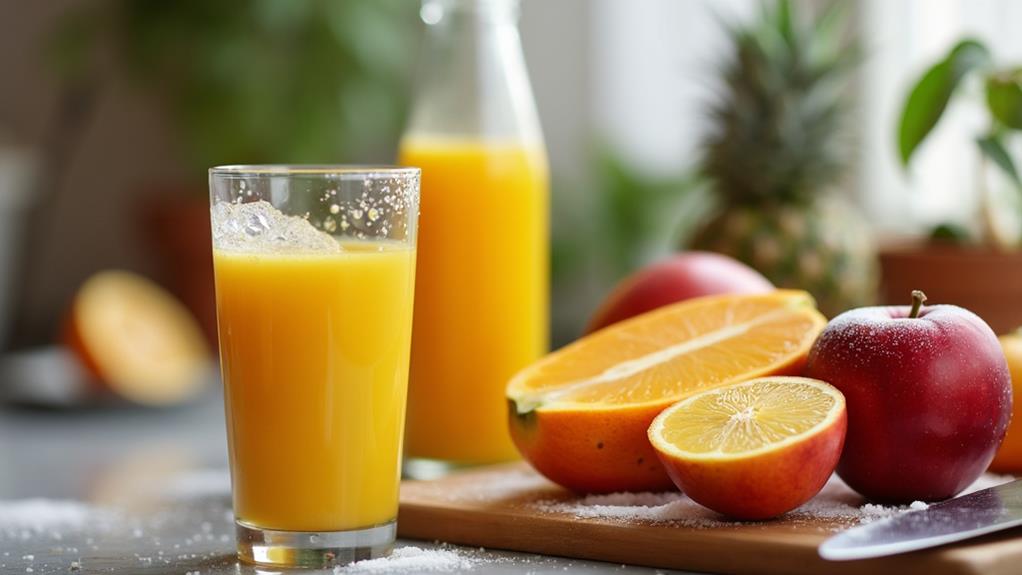
In the domain of home fruit juicing, ensuring safety and proper preparation is crucial. Freshly made juice should be consumed immediately or stored correctly to minimize spoilage risks and prevent bacterial growth. Refrigerate the juice and consume it within 24 hours to ensure safety.
Maintaining the cleanliness of your juicing equipment is essential to prevent contamination and potential foodborne illnesses. Thoroughly clean and sanitize your juicer after each use to ensure both safety and juice quality.
It's important to note that juicing machines often discard the fibrous parts of fruits and vegetables, leading to nutrient loss. While juice is rich in vitamins, the absence of fiber is a drawback to consider. Commercial juices are typically pasteurized to ensure safety and reduce the risk of foodborne illnesses, a process that is difficult to replicate at home.
Recommendations
When making dietary choices, prioritize whole fruits to boost fiber intake, which aids digestion and promotes satiety. Be wary of juice cleanses, as they often lack fiber and can cause rapid blood sugar spikes. For a balanced diet, consume whole fruits daily and limit fruit juice to moderate amounts.
Fiber Benefits in Whole
By opting for whole fruits over fruit juice, you're making a choice that significantly boosts your dietary fiber intake. Whole fruits contain substantial amounts of fiber, a key component often lost during the juicing process. This fiber is crucial for your digestion and promotes regularity, which are essential aspects of general well-being.
Here are four important benefits of consuming fiber through whole fruits:
- Digestive Health: Fiber aids in digestion, helping to keep your digestive system running smoothly and preventing constipation.
- Heart Health: Fiber in whole fruits helps lower the risk of heart disease by slowing the absorption of natural sugars, thereby regulating blood sugar levels.
- Satiety: Soluble fiber found in whole fruits can make you feel fuller for longer, potentially reducing overall calorie intake.
- Daily Intake: Many Americans fall short of the recommended daily fiber intake. Incorporating more whole fruits into your diet can help bridge this gap, ensuring you're closer to the 21-25 grams for women and 30-38 grams for men.
Choosing whole fruits over juice not only enhances your fiber intake but also contributes to better overall health. So next time, grab that apple or orange instead of reaching for the juice!
Risks of Juice Cleanses
Exploring juice cleanses might seem appealing, but it's crucial to recognize the associated risks. These cleanses often lack essential nutrients like protein and healthy fats, which can lead to nutrient deficiencies and impair overall health.
| Risk | Description |
|---|---|
| Nutrient Deficiencies | Juice cleanses lack vital nutrients, potentially leading to health issues. |
| Rebound Weight Gain | Rapid weight loss often results in regaining weight once normal eating resumes. |
| Digestive Issues | The absence of dietary fiber can cause digestive problems and reduced satiety. |
| Ineffective Detox | Juice cleanses don't effectively remove toxins, undermining detox claims. |
Rapid weight loss during juice cleanses can foster unhealthy eating behaviors, often resulting in regaining weight once you return to your usual diet. The lack of dietary fiber can cause digestive issues and hinder satiety, leading to poor appetite regulation.
Moreover, juice cleanses don't effectively detoxify your body, contradicting popular claims. If you're considering a prolonged juice diet, medical supervision is essential due to the risks of electrolyte imbalances and nutrient deficiencies. Understanding these risks can help you make more informed health and dietary choices.

